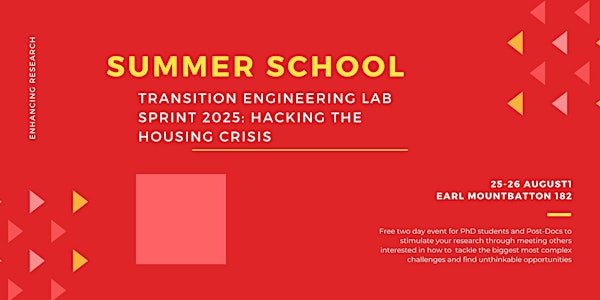
Transition Engineering Lab Sprint 2025: Hacking the Housing Crisis
The Sprint offers a unique opportunity to explore the housing crisis while learning Systems Transition Engineering Processes (STEPs)
Date and time
Location
Heriot-Watt University Edinburgh Campus
Earl Mountbatton 182 Edinburgh EH14 4AS United KingdomAbout this event
- Event lasts 1 day 2 hours
Why this? Why now?
The housing crisis is one of the most pressing and relatable wicked problems of our time. Whether you’re struggling to find a place to rent, dreaming of home ownership, or just wondering why housing is so expensive and hard to access — this is your chance to tackle this wicked problem and discover ways that transdisciplinary research can disrupt these intransigent issues. It’s not just another visioning exercise. The projects will be real-world initiatives that can be supported for development.
The Transition Engineering Lab Sprint offers a unique opportunity to explore the housing crisis through the lens of Systems Transition Engineering Processes (STEPs) — an advanced transdisciplinary approach to tackling complex, unsustainable systems.
What will you learn?
By the end of the two-day sprint, you will learn how to go through to the STEPs in any context of application, from the practical experience of co-investigating the housing crisis:
- Understand how to frame and investigate wicked problems using a systems approach.
- Learn and apply the InTIME Design Sprint — a 7-step method for generating actionable, innovative solutions.
- Collaborate with peers from diverse disciplines to co-design Shift Project concepts that could be developed to inform real-world change.
- Scale project concepts up into action plans for proposals, funders and next steps.
Who should attend?
This summer school is for PhD students, early-career researchers and academics from any discipline who:
- Are curious about systems change, sustainability, or the housing crisis.
- Want to learn practical tools for navigating complex societal challenges.
- Are looking for a collaborative, engaging, and impactful learning experience.
No background in engineering or housing is required — just bring your perspective and willingness to engage.
The Team
The summer school is organised by the Transition Engineering team at HWU Orkney Campus, who has carried out research on the topic of the housing challenge for the last six months, using following the STEPs approach: prof. Susan Krumdieck and prof. Aseem Kinra, together with PDRA Paolo Cherubini Jack Boulton, and PhD Students Luyando Mbozi and Keji Soaga, and Lab Coordinator Sandy Gunn.
Background - Situational context
The UK is committed to building a sustainable, resilient, and equitable future—one that meets net zero and wellbeing targets through long-term energy and material transitions. Achieving this vision requires more than innovation; it demands a new capacity for transdisciplinary systems thinking and mission-driven knowledge infrastructures.
This summer school offers a hands-on opportunity to build that capacity by tackling a real-world wicked problem—the housing crisis—using Systems Transition Engineering Processes (STEPs).
Housing is an essential need
Shelter is one of humanity’s most fundamental needs—so essential that archaeologists often begin their search with the hearth and walls of ancient dwellings.
Today, the housing crisis is a persistent and deeply felt issue, whether in urban centres like Edinburgh or remote communities like Orkney.
This crisis defies simple solutions. It is a systemic challenge, entangled with energy use, transport, affordability, and urban development. Housing is central to the net zero transition, as it intersects with emissions from buildings, transport, and construction. Yet cities resist change due to sunk costs and entrenched behaviours.
Day 1 -August 25
Discovery Stage, and intro to the design sprint
· Stakeholder Clinic (2 hours): Explore diverse perspectives on the housing crisis, gathered through stakeholder interviews.
· Wicked Problem Investigation (3 hours): Use a structured method to uncover the systemic roots of the housing crisis and identify leverage points for change.
· InTIME Sprint Prep (1 hour): Introduction to the 7-step Interdisciplinary Transition Innovation, Management and Engineering (InTIME) design process and the role of data, modelling, and observatories.
Day 2 – August 26
Invention and Development Stages
InTIME Design Sprint (Day 2: 4 hours)
· InTIME Design Sprint (4 hours): Apply the full 7-step process to generate Shift Project concepts and ideas for Data Exchange, Modellization, and Observatory (DEMO) infrastructure.
·Proposal & Planning (2 hours): Something new has been created – borne out of necessity, and unstruck from the wicked problems and faulty assumptions. The final workshop activity involves brainstorming how to take forward the new concepts for shift projects and DEMOs, given the issues with novelty, incumbent inertia, lack of incentives and regulations. The outcomes are development action plans for proposals, funders, interested parties and next steps.